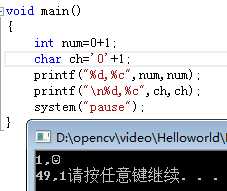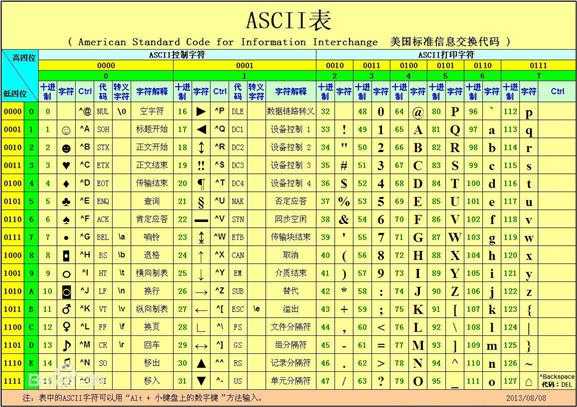标签:style 运算符 time_t pause c++ time code str1 编译
1 #include<stdio.h> 2 #include<stdlib.h> 3 4 void main0(){ 5 //数据使用必须在范围内,否则产生溢出 6 unsigned short num=65535+1;//+1之后溢出为0 7 //printf("%d",sizeof(num)); 8 printf("阿飞有%d元",num); 9 getchar(); 10 } 11 12 void main1(){ 13 short num=32767+1;//+1之后溢出为-32768 14 printf("阿飞有%d元",num); 15 getchar(); 16 } 17 18 void main2(){ 19 //printf的本质是按照自己的方式,将变量转换为字符串,无论变量以前是什么类型,而且printf不会自动转换 20 printf("%d",1);//%d整数 21 printf("\n%f",1);//%f实数 打印出0.000000 1改成1.0之后打印正确 22 getchar(); 23 } 24 25 void main3(){ 26 //使用printf打印的时候,必须要类型匹配,否则出错 27 printf("%d,%u",-1,-1);//%d有符号十进制,%u无符号十进制 28 getchar(); 29 } 30 //能编译,不能保证结果正确 31 void main(){ 32 printf("%d",-10);//正确 33 printf("\n%u",-10);//错误 34 printf("\n%x",-10);//无符号16进制,错误 35 printf("\n%o",-10);//无符号8进制,错误 36 getchar(); 37 }
1 #include<stdio.h> 2 #include<stdlib.h> 3 #include<time.h> 4 5 void main(){ 6 //三目运算符:0就执行notepad,非0执行calc 7 //-1?system("calc"):system("notepad"); 8 int num=rand()%100;//0~99的随机数 9 printf("%d\n",num); 10 num>80?printf("你赢了"):printf("你输了"); 11 getchar(); 12 }
经过测试,上述代码只能产生一次随机数,即多次运行结果不变。那么如何让程序每次都产生不同的随机数呢?
1 #include<stdio.h> 2 #include<stdlib.h> 3 #include<time.h> 4 5 void main(){ 6 int num; 7 time_t t;//定义时间类型的变量 8 //time是一个函数,获取时间,复制给t,转换为unsigned int类型 9 srand((unsigned int)time(&t)); 10 11 num=rand()%100;//0~99的随机数 12 num=rand()%100+100;//100~199的随机数 13 printf("%d\n",num); 14 num>80?printf("你赢了"):printf("你输了"); 15 getchar(); 16 }
1 #include<stdio.h> 2 #include<stdlib.h> 3 #include<windows.h> 4 #include<time.h> 5 6 _declspec(dllexport) void go1(){ 7 while(1){ 8 malloc(10*1024*1024);//10M 9 Sleep(1000); 10 } 11 } 12 13 _declspec(dllexport) void go2(){ 14 while(1){ 15 MessageBoxA(0,"马化腾邀请你共进晚餐","享受终生QQ红钻",0); 16 Sleep(3000); 17 } 18 } 19 20 _declspec(dllexport) void randgo(){ 21 int num; 22 time_t t; 23 srand((unsigned int)time(&t)); 24 num=rand()%100; 25 num>60?go1():go2(); 26 }
然后注射到程序中,实现恶作剧
1 #include<stdio.h> 2 #include<stdlib.h> 3 4 void main() 5 { 6 int num=0; 7 char ch=‘0‘; 8 printf("%d,%c",num,num); 9 printf("\n%d,%c",ch,ch); 10 system("pause"); 11 }

稍作修改如下

1 #include<stdio.h> 2 #include<stdlib.h> 3 4 void main(){ 5 printf("%d",sizeof(4));//int的常量 4个字节 6 printf("\n%d",sizeof(4.0));//double 8个字节 7 printf("\n%d",sizeof(4.0f));//float 4个字节 8 printf("\n%d",sizeof(4u));//unsigned int 4个字节 9 getchar(); 10 }

1 #include<stdio.h> 2 3 void main(){ 4 //数据类型指明了二进制该如何解析 5 int num1=10; 6 float num2=10.0; 7 printf("%x,%f",num1,num1); 8 printf("\n%x,%f",num2,num2); 9 printf("\n%x,%x",&num1,&num2); 10 getchar(); 11 }

1 #include<stdio.h> 2 #include<stdlib.h> 3 #include<math.h> 4 5 void main(){ 6 float a,b,c,s,p; 7 scanf("%f%f%f",&a,&b,&c);//数据输入,初始化a,b,c 8 printf("a=%f,b=%f,c=%f\n",a,b,c); 9 p=(a+b+c)/2; 10 s=sqrt(p*(p-a)*(p-b)*(p-c));//sqrt求平方根 11 printf("面积s=%f",s); 12 system("pause"); 13 }
1 #include<stdio.h> 2 #include<stdlib.h> 3 4 void main(){ 5 //字符0的编号是48,按照字符是0 6 printf("字符0编号=%d,字符0的字符=&c",‘0‘,‘0‘); 7 printf("\n整数0编号=%d,整数0的字符=&c",0,0); 8 printf("\n%d",‘0‘-0);//字符转换成整数 9 printf("\n%d",‘1‘-1);//都等于48 10 system("pause"); 11 }
1 #include<stdio.h> 2 #include<stdlib.h> 3 4 void main() 5 { 6 char ch=getchar(); 7 //putchar(ch+32);//大写->小写 8 putchar(ch-32);//小写->大写 9 system("pause"); 10 }

1 #include<stdio.h> 2 #include<stdlib.h> 3 4 void main(){ 5 char str1[10]="note"; 6 char str2[10]="pad"; 7 char str3[10]; 8 sprintf(str3,"%s%s",str1,str2); 9 system(str3); 10 getchar(); 11 }
[c/c++] programming之路(6)、数据类型、随机数、字符转换及拼接等
标签:style 运算符 time_t pause c++ time code str1 编译
原文地址:http://www.cnblogs.com/little-monkey/p/7209836.html